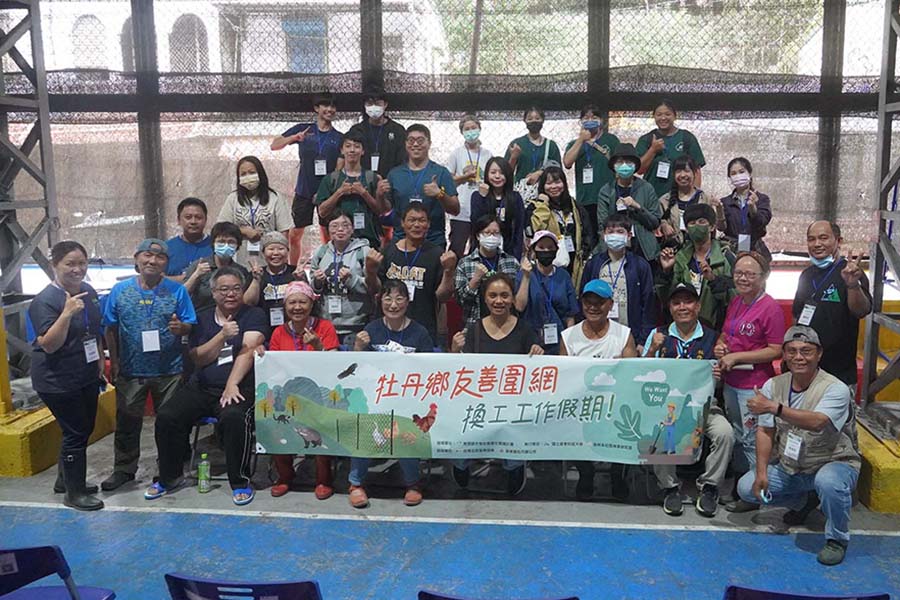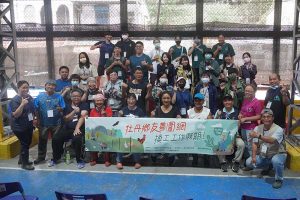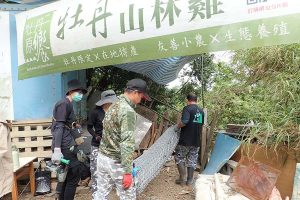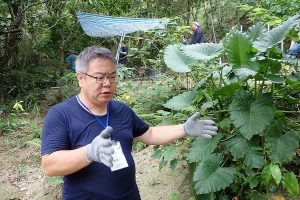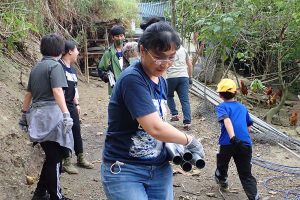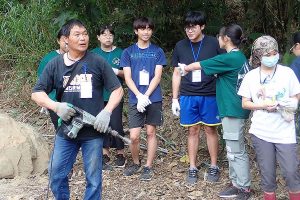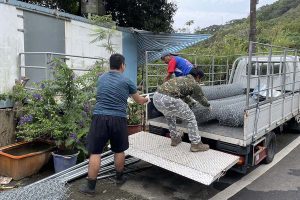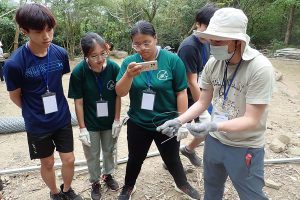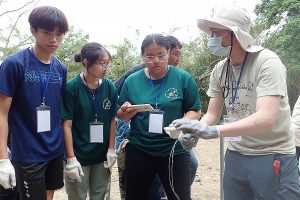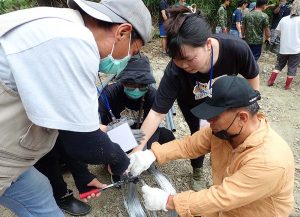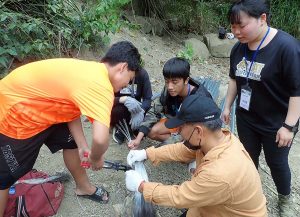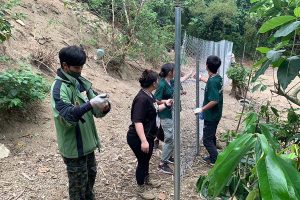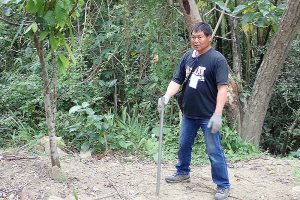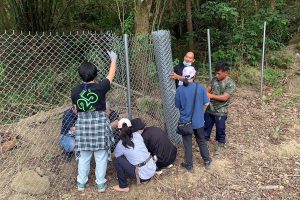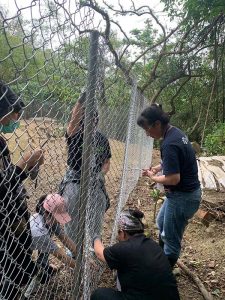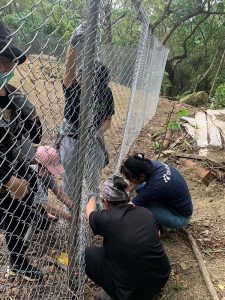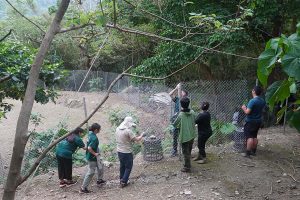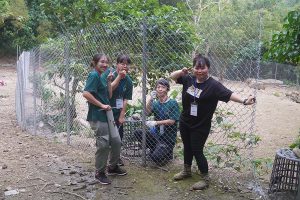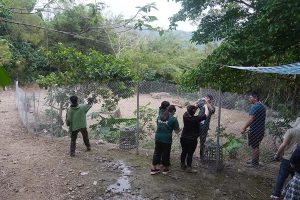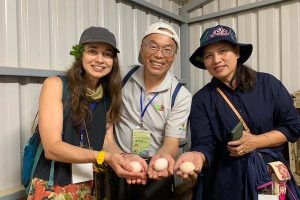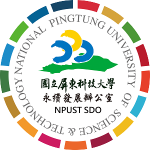The Mudan Township Office submitted the “Pingtung County Mudan Township Placemaking Project” to the National Development Council in April, 2018. With the support from the National Development Council and the Forestry Bureau (Council of Agriculture, Executive Yuan), the Mudan project became the first government sponsored ‘Under Forest Economies’ placemaking project in the Taiwan. Since 2020, the Mudan Township Office has been cooperating with the National Pingtung University of Science and Technology (NPUST) to provide guidance to tribal people, and helping them apply economic strategies for raising chickens in natural mountain forest areas. However, since the beautiful mountains and rivers of Mudan Township form an excellent habitat for wild animals, large numbers of crab-eating mongoose, masked palm civets, and Taiwan macaques have created major problem for chicken farmers.
In order to raise native chickens according to an eco-friendly manner and co-prosper with wild animals, the NPUST Community Forestry Center is coordinating with the Ministry of Education USR Project and cooperating with the Leopard Cat Association of Taiwan on educational activities. On April 22, the team organized “Mudan Township Netting Au Pair Holiday”. Professional netting volunteers (Shi-Ye Chiu, Chi-Chung Chen, and Ting-Chun Lin) cooperated with local farmers (Hong-Hsiang Hua, Meng-Hsuan Kuo and Shu-Chen Lin) to conduct fencing demonstrations including environmental assessments of the netted fence installations (habits and routes of wild animals), post positioning, piling machine operations, and wire cutting. Students from NPUST were able to participate in the actual fencing work, and the “au pairing” concept is being applied with expectations that farmers from different tribal villages will also become mutual support partners in the future.
According to Shu-Chen Lin, a farmer who participated in the activity, the experts from Leopard Cat Association of Taiwan used a very different method of fencing than the tribe normally uses—allowing for a more robust outcome. For example, they drove their piles to a depth of 70cm instead of about 10cm as they used to do. Dr. Mei-Ting Chen of the Leopard Cat Association mentioned that she was very happy to come from Miaoli to Pingtung’s Mudan Township to help. Although it’s a very far journey, the volunteers from the association were happy to be able to help the tribe, and further the mission of the conservation.
In the past, most of the tribes have raised chickens in the mountains for their own food. However, as part of a strategy to help revitalize the economies of mountain villages, raising chickens in the mountains will also play an important role. As they move forward, they will need to consider carrying capacity limitations of the environment, how to reduce chicken casualties, and how to improve breeding rates. Professor Meihui Chen from the NPUST Department of Forestry has been leading the team from Community Forestry Center as it works to integrate tribal communities, academic circles, and the public sector. Starting from scratch in Mudan Township in 2020, the team has taught technical systems for friendly chicken farming to the tribes, and introduced the Chung Hsing Red Feather 1982 Native Chickens, preserved by Chung Hsing University, as the main breeding species. They also created the “Mudan Mountain Forest Chicken” brand which is lending support to more than 40 farmers as they develop Satoyama micro-economies. As of April 2023, more than 15,600 chickens of this breed have been raised in Mudan Township. If one chicken is sold for 700 NTD, that translates into an output value of nearly 10.92 million NTD.
NPUST’s Professor Meihui Chen has been deeply involved in discussions between the tribes, and looking for ways to eliminate conflicts between agricultural development and tribal culture preservation. In the past, the au pair concept was applied as an important method of agricultural exchange between tribes. Au pair was used during rice planting and farming and at weddings and funerals. This strong demonstration of human touch and the exchange of knowledge and information were important aspects of the relationships that existed between tribes. Through the current Mudan Township Netting Au Pair Holiday activity, hopes are to promote the Mudan Mountain Forest Chicken brand while simultaneously working for the preservation of wild animal habitats. Meanwhile, the tribe’s “au pair” culture, which emphasizes the emotional connection between ethnic groups, can also inspire college students to become more deeply involved forest service activities. This way, the practice of University Social Responsibility can be of greater service to local areas by creating mutual help teams for Mudan Mountain Forest Chicken raising –thus creating an all-round-win for knowledge exchange, conservation and the local economies.




